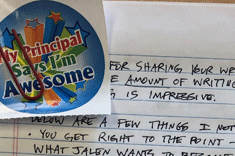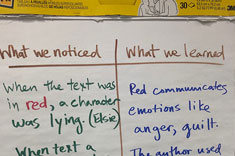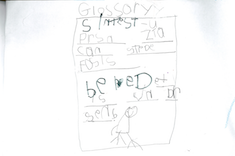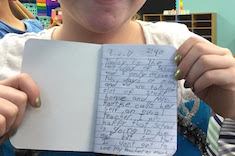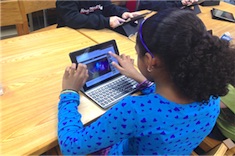Matt Renwick
Matt Renwick is a systems coach for CESA #3, a state-supported education service agency in Southwestern Wisconsin. During his 20-year career in education, he has served as a principal in two Wisconsin elementary schools and as a middle grades vice principal, teacher, and athletic coach.
All Content
Beyond Compliance: A Framework for Supporting Literacy Engagement and Empowerment
Matt Renwick shares a project that developed students as readers, collaborators, and problem solvers. Through reflection on this project, Matt guides us to intentionally be leaders who engage and empower students to be active learners.
The Other Foundational Reading Skills
We know that readers do more than decipher a text. Matt Renwick shares research that supports teaching readers more than foundational skills. He highlights metacognition, executive functioning, and mindfulness.
More Than Skills and Scripts: Systems That Lift Literacy Up
One of the most consistent challenges teachers and leaders face is knowing what to trust during literacy instruction: the practices and resources they are expected to deliver with fidelity, or what they observe while teaching readers and writers. Matt Renwick offers two ways to shift practices: school-wide assessment and instructional walks, as well as guided reflection questions.
Rethinking Flow in the ELA Classroom
When students are empowered to make decisions, they value the learning experience and take ownership of the outcomes. Matt Renwick turns to the concept of flow and imagines its importance for engaging readers and writers.
Design for the Edges: Strategies for Supporting Unique Readers and Writers
The phrase “design for the edges” is about creating more inclusive and welcoming spaces for all students. Matt Renwick pushes us to consider what this looks like in classrooms where all readers and writers are honored.
Be Hard on the Systems and Gentle with the People: How a Systems Approach Can Reduce Teacher Burnout and Lead to Better Outcomes
This article makes the case that schools can be more intentional about interrogating the practices and policies that may be contributing to some of the very problems we attempt to prevent in the first place. Put more succinctly, Matt Renwick advocates for being hard on the systems and gentle with the people.
How to Build Your System for Knowing, Thinking, and Writing
Your notes deserve better than to be forgotten. Matt Renwick shares a system that supports what you know, think, and write and helps ensure your ideas have a home beyond a disorganized binder.
Teachers as Leaders: Five Ways to Create the Conditions for Change (Part 2)
In this second installment, Matt Renwick clarifies a pathway school leaders can take as they seek more equitable outcomes for all students. School improvement is complex, adaptive work. The five Vs framework acknowledges this reality and provides structure without imposing rigidity.
Teachers as Leaders: Five Ways to Create the Conditions for Change (Part 1)
Matt Renwick shares a model to lean on as teachers and coaches navigate the unpredictable terrain of school-wide change. This is the first installment of a two-part series.
The Difference Between Change and Transition
Matt Renwick teases out the differences between change and transition. Transitions have a longer timeline than change. Leaders can accelerate this process by building trust, providing clarity, and understanding the process that comes with renewal.
The Coach’s Notebook: How to Capture and Organize Your Notes to Support Your Practice
Matt Renwick opens his own coaching notebook and teaches school leaders ways to support teaching and learning through structured note-taking. The coach’s notebook is not art; it is a tool that supports your practice.
Navigating Bias and Assumptions in Literacy Coaching
Matt Renwick helps literacy coaches and leaders recognize and navigate their assumptions and biases when working with teachers. He provides a helpful checklist as a practical place to begin.
The Confident Coach: Seven Competencies to Empower Your Practice
Matt Renwick shares the qualities of a confident coach. Take a coaching competencies assessment to find out where your strengths lie.
Book Rationales for Building Trust and Guiding Decision-Making
Matt Renwick shares a wise and helpful response when a teacher is looking for support for using a text with mature content in her classroom. Learn about book rationales, how to find them, and how to create one of your own with ChatGPT. More importantly, consider how to engage in conversations rather than offer blanket mandates about whether a book is allowed in classrooms.
The Digital Declutter: Developing a Life Beyond Distractions
Matt Renwick helps us consider a digital declutter. We all have limited time, and we have choice and agency. It’s up to us to decide what we want to commit our attention and time to today and in the future.
January 17, 2025: More Engaged Students
This week’s newsletter is about engagement.
Using Metaphors and Analogies to Help Educators Shift Their Thinking and Change Their Practices
Matt Renwick shares the power of using metaphors and analogies during coaching conversations.
How to Promote Civil Discourse in Your Classroom
Matt Renwick shows how to build the capacity of all students to engage in civil discourse.
Shaping the School Culture to Encourage Professional Growth
Matt Renwick offers three suggestions for school leaders who want to shape school culture to encourage professional growth.
Making a Case for Leadership Coaching
Matt Renwick outlines a four-step process to engage in leadership coaching.
Beyond the Books: A Tale of Empowerment, Influence, and Agency from the School Library
Matt Renwick shares about a project in the school library that builds students’ empowerment, influence, and agency. Matt gives resources and advice for you to try this in your school, too.
Five Questions to Ask When Reviewing Literacy Curriculum
Matt Renwick uses five questions to lead a team through reviewing a literacy curriculum resource. Download the checklist to use during your own review process.
Off the Hook: How to Engage With and Reframe Our Obstacles to Reduce Anxiety and Stress
Obstacles are a part of literacy leadership. Matt Renwick offers three steps to reframe our obstacles to reduce anxiety and stress.
Examining (and Changing) Our Literacy Beliefs over Time
Changing one’s mind in today’s educational world can feel risky. We fear looking incompetent or like we don’t know what we believe. Matt Renwick learned firsthand that when leaders share how their thinking and beliefs around literacy instruction has changed, it increases the level of respect from others.
Quiet Coaching
Matt Renwick offers insightful ideas about reaching colleagues who are resistant to coaching. Matt offers three steps and practical ideas to “quietly coach.”
Misreading Body Language
Matt Renwick reminds us of the benefits and dangers of reading (or misreading) body language, and offers a way to get to the heart of communicating clearly.
Big, Loud, and Slow: Six Strategies for Better Public Speaking
Matt Renwick worked with a speech therapist after having a stroke. Through this process, he realized powerful teaching points to help students become stronger public speakers.
How to Manage Our Frustrations in Difficult Times
Matt Renwick offers an insightful perspective on how anger arises in educators, where it comes from, and what to do about it.
Coaching Up: How Teachers Can Support School Leaders ’ Capacity for Positively Influencing School-wide Instruction
Matt Renwick encourages school leaders to be brave and engage a teacher as a thought partner. This helps leaders construct a better understanding of school-wide instruction.
Coaching from Teachers’ Strengths
When observing literacy instruction, Matt Renwick asks the question “Who is being served and who is not?” This allows an entry point into a conversation based on teacher strengths while simultaneously being aware of equitable practices.
Three Archetypes as Advocates for the Science of Reading
Matt Renwick defines three archetypes of personalities he has observed who have incomplete understandings about the science of reading. Matt offers approaches to each person, and notes that no one person neatly fits into a simple archetype.
How to Hire a Great Teacher
Matt Renwick encourages leaders to leverage the power of aligned hiring procedures for recruiting, interviewing, and selecting great teachers.
Navigating the Science of Reading: How to Hold a Professional Conversation About Teaching Readers
Matt Renwick helps leaders navigate science-of-reading conversations with these three powerful tips.
A Richer Picture: Assessing Our Students as Readers (And Not Just in Reading)
Matt Renwick shares a powerful story of a student growing leaps and bounds as a reader. He insists that we must always look beyond isolated data points, and gives several resources to richly assess students as readers.
The True Test of Leadership
Matt Renwick delivers a powerful essay about the true test of leadership as he reflects on a sustained medical leave of absence. Matt reveals the importance of shared leadership and offers guidance to strengthen it in your school.
35 Ways Leaders Can Improve School Culture
Matt Renwick shares 35 actions leaders can take to create a stronger school culture. If you are a new leader, you can use this list and implement one a week throughout the school year.
Feedback Is Overrated: Focus First on Building Positive, Trusting Relationships
Matt Renwick gives three tips to build relationships that will open doors to receive feedback.
Five Classroom Design Ideas for Supporting Readers and Writers with ADHD
Matt Renwick encourages five classroom design ideas for supporting readers and writers with ADHD.
Coaching Toward Independence: Using an Instructional Framework to Guide a Principal-Teacher Conversation
Matt Renwick shares how leaders can use an instructional framework to bridge discussions that will honor teachers’ professional learning journeys.
Reshaping Personal Narratives with Awareness, Reflection, and Support
Matt Renwick shares a candid personal story of his own diagnosis of ADHD, and then encourages us to consider the way the narratives we create about who we are and who we might become are based on how we perceive our pasts. Matt challenges us to resist these narratives and reshape them with awareness, reflection, and support.
Leading Literacy: What to Expect the First 5+ Years
Matt Renwick has compiled a guide for new principals to follow to intentionally become effective literacy leaders.
Slicing Up the Pie
Matt Renwick masterfully outlines a complexity of public education: We are constantly making decisions on behalf of our students, and they rarely fully meet every kid’s needs. Knowing these limits and keeping students at the center of decision making (as opposed to the loudest calls to action from parents) ensures a more equitable educational experience for all.
Building a Schoolwide Coaching Culture
Matt Renwick offers three contexts in which a coaching culture is deliberately built and supported in school.
Status of the Class for Readers and Writers
Matt Renwick reflects on the importance of building students’ identities as readers and writers and the power of a daily status of the class. Download a template to put this routine in place in your own classroom.
A Sense of Accomplishment: Four Strategies for Making Students’ Literacy Learning Visible
Matt Renwick makes the connection that learners are engaged when there is a meaningful goal. He outlines ways to make the process visible to lead to a sense of accomplishment. Download a copy of the Reading-Writing Portfolio Table of Contents.
Hanging Out, Messing Around, Geeking Out (or, how to give students the resources, space, and time for self-directed literacy learning)
Matt Renwick challenges educators that if we believe that social and emotional learning is just as important as academics, then we ought to use resources, space, and time to support self-directed learning.
When the Best Coaching Is Offering Advice
Matt Renwick shares a classroom observation and his process for discerning what kind of feedback to give. By considering different coaching approaches, as well as their limits, Matt concludes that sometimes the best coaching is offering advice.
How to Use Students’ Reading Logs as a Formative Literacy Assessment
Matt Renwick reminds us that there is a lot of information available in our classrooms that can inform instruction. Some of it is “hiding in plain sight,” for example reading logs.
Five Phrases That Should Be at the Top of Every Writer’s First Draft
Matt Renwick gives five phrases every writer should put at the top of a draft, and then explores the way doing so can help develop creativity.
Three Books that Changed How I Teach and Think About Reading
Matt Renwick reflects on three essential professional books for understanding how to teach and think about reading instruction.
Affirm, Acknowledge, Ask: A Simple Protocol for Communicating Feedback
Matt Renwick offers an effective protocol for communicating feedback.
Sincerely Positive
Matt Renwick offers advice on how to use feedback as a tool to support and reinforce what students are doing well. Sincerity and positivity will always give students more confidence in themselves as writers.
One Powerful Way to Improve Your Strategic Plan
Matt Renwick offers one powerful strategy to improve your strategic plan by considering the obstacles and how to overcome them.
How to Let Go of Outdated Literacy Practices
Matt Renwick shares research, experience, and practical application to disrupt outdated literacy practices and make room for new ways of teaching and learning.
Five Business Books Every Leader Should Read
Matt Renwick shares five business books every school leader should read.
Four Tools for Hosting Online Book Clubs
Matt Renwick leads us to design book clubs where students can continue to grow and connect as readers in online discussions.
Resisting the Scripted Curriculum
Matt Renwick offers four suggestions on how to make literacy tasks from a scripted curriculum meaningful.
Trust Your Tools. Trust Your Teachers
Matt Renwick cracks open his process for trusting teachers and encouraging growth through coaching conversations.
Hiring Teachers for Today and Tomorrow
Matt Renwick explains how his leadership team’s thinking has changed when it comes to hiring teachers, with a much stronger emphasis on figuring out how candidates might handle change in the future.
How Teacher Evaluation Can Support School-Wide Change
Matt Renwick explains how teacher evaluation can be integrated into school-wide plans for literacy improvement by attuning to “promising practices.”
One Text. One Conversation. Many Possibilities.
Matt Renwick explores ways in which whole-class conversations around one text can build a strong community as understanding is co-constructed.
Leaders Need Coaches Too
Matt Renwick explains why literacy leaders need coaches and how they are helpful.
Maintenance as Leadership
Matt Renwick encourages a continuous effort of ensuring the systems of a school are operating as they should by maintaining relationships, literacy and learning, and presence.
Building Writer Relationships with Author Studies
Matt Renwick shares creative ways teachers in his school celebrate authors.
Listen to Lead
Matt Renwick is disappointed by something he sees when he visits a teacher’s classroom. This leads him to ponder what his role is in supporting teachers as they make changes.
Followership
An essential role for leaders is raising up more literacy leaders among the talented teachers on staff. Matt Renwick considers how anyone without a title or an obvious source of power can lead, and what that means for nurturing leadership skills.
Data That We Can Trust
Matt Renwick finds the data closest to the students we serve is more helpful to teachers than many benchmarks or screener scores.
How Do Literacy Leaders Supervise and Support Online Instruction?
Supervising and supporting instruction is never easy for literacy leaders, and remote settings compound the challenges. Matt Renwick shares his best advice for providing assistance in virtual learning environments.
Developing Literacy Traditions and Rituals
Matt Renwick reflects on the traditions and rituals that strengthen a school-wide literacy community.
Feedback That Fortifies
Matt Renwick considers what type of feedback from school leaders can be most helpful to teachers.
Professional Renewal: Facilitating Change Within Ourselves
If we want others to change, we first have to be open to change within ourselves. But what does that look like, and how can we embrace the tension that change brings? Matt Renwick explores change from within for literacy leaders.
How Am I Doing? One Principal’s Experience with Feedback
Matt Renwick is like any of us—he is nervous about what he will learn when he asks teachers to assess his performance as a principal. He shares findings from a survey he gives to teachers.
Teaching Constructed Response Before Exams
Teaching the genre of tests can seem far removed from writing workshop. Matt Renwick explores how to teach constructed response in a way that is integrated with the tenets of good workshop instruction.
A Little Bit of Clarity
Matt Renwick goes out to buy a new pair of glasses, and gets a stern lecture on taking care of them. The experience makes him ponder how we get clarity for best practices in literacy instruction.
The 70% Rule
Stretch yourself, but not to the point of pain. Matt Renwick has practical tips for how leaders can continue to push themselves to grow and learn new things without succumbing to the hurry-up, stressed culture so prevalent around us.
Environmental Walks: A Snapshot of a Literacy Culture
If you want to get a quick snapshot of literacy instruction at your school, do an environmental walk. Matt Renwick shares his process and notes from one of these walks, as well as the issues they raise.
Where Confidence Begins
Learning new things is sometimes hard, if only because it brings out our vulnerabilities and insecurities. This is particularly true for leaders, who are already supposed to know everything. Matt Renwick uses the experience of learning to build a fence to model learning for teachers.
Celebration and Reflection for Teacher Growth
Matt Renwick rejects the notion of “carrots and sticks” for school improvement when it comes to understanding and motivating teachers. He provides a template for a professional development session to help teachers celebrate and reflect upon growth.
Best Intentions with No Assumptions
Matt Renwick considers how assumptions about teachers and students can stymie leaders and learning in schools.
Blind Spots
Matt Renwick has to confront his “blind spots” and assumptions when his data from instructional walks about classroom talk in small groups and whole-class teaching situations does not match teacher perceptions.
Never Again
Matt Renwick explains how the Never Again protocol for professional development sessions can help teachers rethink and revise their literacy practices.
Readers Want to Respond
Matt Renwick is surprised when his son completes a reading quiz that isn’t required, and finally realizes it’s all about reading response.
An Ounce of Doubt
Matt Renwick decides to provoke some cognitive dissonance in teachers around the topic of guided reading. He finds his own beliefs are challenged instead.
Finding Time for Classroom Walk-Throughs
Matt Renwick is surprised when teachers evaluate his school visibility as weak. He decides to make his classroom visits more purposeful, and shares the strategies he implements.
Aligning Commercial Practices with Excellent Literacy Instruction
Matt Renwick explores how literacy leaders can help teachers stay true to a shared vision of instruction and learning as they explore commercial program options.
Hidden Treasures
Matt Renwick describes the process of paying attention to telling details, and gives practical advice for teaching this skill to young writers.
The Hole in Your Swing
The hole in your swing is your greatest weakness as a literacy leader. Matt Renwick explains how you can face your own vulnerability as a literacy leader and tackle it head-on.
A Literacy Foundation
A literacy community is only as strong as its foundation. Matt Renwick uses discussions around mission statements and shared texts to build a collective vision for literacy instruction in one school.
Data Pictures Instead of Data Walls
Matt Renwick finds that data pictures instead of data walls are less intimidating for staff, and also allow for some creative collaboration around what data might be useful in analyzing achievement.
Community over Connectivity: Mindful Technology Practices
Matt Renwick considers how technology can hinder building relationships or be used as a tool in fledgling classroom communities.
Three Challenges for the 40 Book Challenge
Matt Renwick encourages you to ask a few critical questions before you adopt the 40-Book Challenge or any other activity with a number for a goal you’re going to be tied to all year long in your classroom.
Whenever They Are Ready: Building Trust for PD Success
Matt Renwick finds he needs to take a deep breath, listen, and be open to options when there is a disagreement about next steps in a school improvement initiative.
Rethinking Morning Announcements
"Are you going to read one of your stupid quotes again?" This question from a "frequent flyer" in the principal's office got Matt Renwick to consider ways to change up the morning announcements with a variety of literacy-related components.
Resisting Traditional Definitions of Productivity
Matt Renwick explores the differences between commonly accepted measures of productivity and the work that has the most value for literacy leaders.
Old Technology for New Engagement
Matt Renwick repurposes nearly obsolete technologies such as typewriters and Polaroid cameras for surprising new learning in classrooms.
Personalizing Professional Learning Opportunities
Matt Renwick considers how literacy leaders can help teachers tailor professional development to their individual needs.
Fail to Learn
Which grade level would you least like to teach? Matt Renwick explains why you need to confront your fears and do a demonstration lesson with those students. In Matt’s case, the lesson involved entering the wonderful world of kindergarten.
Developing a Principal and Coach Partnership
Matt Renwick explains how he works as a principal to build a relationship with the school's literacy coach, including scheduling weekly meetings and sharing responsibilities in whole-staff meetings.
Using Tech to Find Authentic Audiences for Student Writing
Matt Renwick discovers technology provides many authentic audiences for student writing.
Literacy and Global Competence
“China is going to kill us all!” This quote from a student causes Matt Renwick to stop and consider how schools can use literacy to promote global understanding.
Breakthroughs and Barriers: Going Schoolwide with a Literacy Initiative
What’s going well with literacy in your teaching community? What’s getting in the way? Matt Renwick considers breakthroughs and barriers in making literacy instruction more of a priority in his school.
Embedding Reading into Staff Meetings
Matt Renwick shares how he elevates routine meetings by embedding discussion of professional reading into them.
Going Google as a Literacy Leader
Matt Renwick combines principles for productivity with Google tools to organize his work.
Professional Learning Beyond PLCs
Matt Renwick shares three alternatives to PLCs that are less time intensive and can be integrated into existing meetings and routines.
Learning and Leading Through Teaching
If you want to understand the real concerns of teachers, you have to teach children. Not only in demonstrations, and not only collaboratively, but solo with the constraints any teacher faces. Matt Renwick explains how these experiences are invaluable for his work as a literacy leader.
A Third Way
Matt Renwick is asked to intervene by a group of teachers with a support staff member who isn't meeting their expectations for working with students. And then things get complicated.
Using Digital Tools for Instructional Walks
Matt Renwick avoided using digital tools during classroom visits in order not to intimidate teachers. He shares how over time his practice changed when he saw the power of some tools for expanding and extending his communication with colleagues.
Resisting Rubrics
Matt Renwick explains why sometimes the best way to grow reading abilities in students is to resist rubrics.
Moves for Struggling Writers
Here are Matt Renwick's three favorite moves for helping struggling writers.
It’s the Little Things: Small Actions for Building a Healthy Literacy Culture
Matt Renwick explains how everything from symbols to basic cleanliness in schools affects the climate for literacy.
Can Anyone Be an Instructional Coach?
When it comes time to hire a new literacy coach, Matt Renwick finds himself focusing on three simple and essential qualities every coach must possess.
Using Concern Forms for Feedback
Matt Renwick explains why it’s useful to give staff a platform to share any concerns anonymously—even those that might seem trivial at first glance.
Authentically Curious
Matt Renwick is stunned when a teacher complains that he doesn't take the time to know the staff. After getting over his initial anger, he decides on two strategies to address the problem.
Summer Quiet and the Three Rs
Matt Renwick shares his “Three Rs” for literacy leaders in the summer: read, reflect, and recharge.
Video Games and Literacy
Matt Renwick finds there is value in connecting video games and literacy in classrooms, once he and the teachers he works with can get past their leeriness.
A Better Hiring Process
Matt Renwick shares five tips for ensuring you have a smooth and smart hiring process.
Paraphrasing to Let Teachers Lead
Matt Renwick talks about the importance of paraphrasing and meandering in conversations after classroom observations so teachers can take the lead in their learning.
Literacy and Last Days: Keeping It Simple
Matt Renwick knew he didn't want any showy event for the last day of school, so he concentrates on finding quiet ways to celebrate reading and writing that don't stress staff or students.
The Thin Line Between Mentoring and Coaching
Matt Renwick resists the urge to console a teacher who is disappointed in a student assessment. Instead, he considers whether taking on a mentoring or coaching role would be most helpful.
Improving Professional Learning for All
Matt Renwick explains why the work before and after any professional development session is crucial in helping teachers become invested in the work.
It’s Not About Us
Matt Renwick realizes that sometimes we have to ignore our path as learners to help teachers find their own way to better instruction.
Supporting Introverts at Any Age
What many school leaders, teachers, and students have in common is that they are introverts. Matt Renwick remembers exhaustion from his first year of teaching because of introversion, and offers suggestions for meeting the needs of introverts in any school community.
Unspoken Leadership
Matt Renwick attends a recognition ceremony for high school students, and realizes that many of the traits celebrated in the students are the marks of quiet leadership.
Sustaining Trust While Maintaining High Expectations
Matt Renwick tackles a tricky issue for literacy leaders. How do you build a relationship of trust when there are clearly issues with the quality of a teacher's instruction?
Getting Started with Student Podcasting
If you’re interested in launching student podcasts, Matt Renwick has resources and tips for getting started.
Stop Paying in Quarters: Changing Thinking and Practice
Matt Renwick pays tolls the old-fashioned way on a long drive, and ponders connections between his experience and teachers’ resistance to tech innovations.
200 Feet
“Never more than 200 feet from a book.” That’s the goal in Matt Renwick’s school, and in this photo essay you can see creative possibilities for sharing books throughout a school (and outside, too!).
Making Standards Work for You
Matt Renwick shares a template he uses with teachers to help standards inform their work.
Assessing Our Impact
Matt Renwick explains how classroom walk-throughs and surveys can be powerful tools for assessing your impact—if you collect the right data.
Making Classroom Visits a Habit
Matt Renwick examines the cues, routines, and rewards that are necessary for making classroom visits a regular part of his daily routine.
Every Classroom, Every Day
Matt Renwick shares the many benefits of literacy leaders spending as much time as possible every day in classrooms.
“Got a Minute?”: Rethinking My Schedule and Priorities
Matt Renwick rethinks his strategy of responding instantly to requests for his time, considering his priorities as a literacy leader.
Essential Resources for Building Professional Learning Communities
Matt Renwick shares his favorite online and print resources for PLCs, including templates and surveys for planning before groups are launched.
Questions for Reflection and Goal Setting with Teachers
Matt Renwick shares some of his favorite questions and strategies for promoting reflection and goal setting with teachers.
Closing the Year Strong: Leveraging Technology When Time Is Short
Matt Renwick shares some strategies for connecting with teachers during the stressful last months of school.
Transcribing Conversations During Instructional Walks
Matt Renwick finds transcribing brief snippets of conversation with students during his daily instructional walks ensures the focus stays on students in conversations with teachers.
The Students Behind the Numbers
Matt Renwick shares the challenges and benefits of using multiple measures to inform instruction with an example of the impact of a read aloud in a fifth-grade classroom.
Rewriting the Script
Matt Renwick challenges leaders to notice the way some of the routines (or scripts) in our lives hinder our ability to move forward. He encourages confidence in taking risks that allow for personal and professional growth.
The Coach’s Notebook: How to Capture, Organize, and Analyze Your Data and Responsibilities
Matt Renwick opens up his coach’s notebook and guides us in establishing a tool that supports teaching and learning.
The Digital Declutter: Developing a Life Beyond Distractions
Matt Renwick offers a no-nonsense approach to a digital declutter in an effort to manage his time. Inspired by the book Digital Minimalism by Cal Newport, Matt shares practical ways for educators to consider a digital declutter.
When Coaching Fails: How to Help Educators Who Resist Help
Matt Renwick dives into the reasons why coaching sometimes fails and what we can do when we encounter colleagues who are “help resistant.”
Why Don’t School Leaders Give More Feedback?
Matt Renwick insists that school leaders don’t have to forfeit their identities as supervisors to engage in coaching conversations with faculty members. He offers five tips to build relational trust today.
Benefits and Challenges of Using AI as a Coach
Matt Renwick offers three ways ChatGPT can support the work of instructional coaches.
When Coaching Fails: How to Help Educators Who Resist Help
Matt Renwick digs into the reasons educators are resistant to change and offers advice for next steps when it seems like coaching has failed.










